Spin-off series: Becoming the Bar
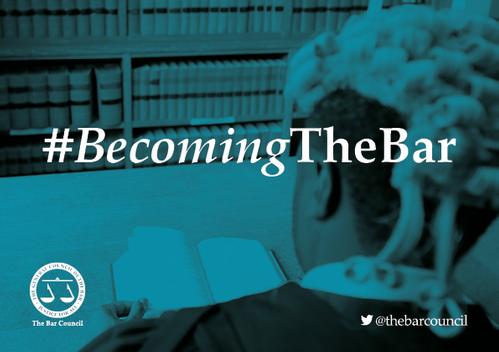
This spin-off series of the #IAmTheBar campaign profiles recent and current pupil barristers from under-represented backgrounds.
They discuss their backgrounds and upbringings, their experiences of training as a barrister and challenges and tips for today's aspiring barristers, particularly in light of the effects of Covid-19 on the Bar.
Read about their journeys below.
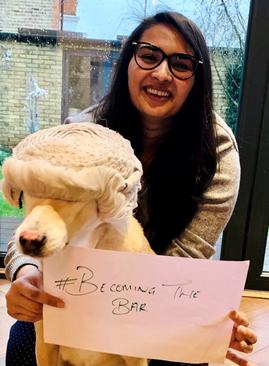
1. Tell us about your background and why you decided to become a barrister.
I had a very difficult childhood and my family life was tumultuous. Having grown up in rural India, my father made the decision to enrol me in a Catholic convent. The standard of education was extremely low with greater emphasis on “moral” education. At the age of 16 when I was finally able to move to the UK, it was evident how inadequate my education was and unfortunately the two years of A-levels was insufficient time to make up the huge gap in my education.
Furthermore, I had a learning disability which was only later diagnosed in my thirties. As a result, I never completed my A-Levels and the two years were only sufficient to complete a portfolio for art school. Although art school was a viable option it wasn’t necessarily the best fit either given I did not have much interest or talent as an artist. Eventually I left university with a lower second degree. I graduated in 2009 with a degree in Visual Communication and subsequently completed a Masters in Curating from the University of Arts.
Although during my time as a curator I was fortunate to work on interesting projects, the art world is notorious for unpaid or low paid work. Having graduated in the midst of the 2008 financial crash and without parental support, my average week included juggling 3 jobs; Working nights in pubs/clubs to make up the shortfall. I met several young persons, equally qualified, who were struggling to maintain a decent living and I became disillusioned with the exploitative environment of the art world.
It was during this time I became increasingly interested in social justice and politics. The troubles of my childhood, witnessing mistreatment of women in India and the financial hardships later as a young person all led me to want to practice law. I felt that I could no longer be a bystander.
In 2016 I decided to undertake the law conversion course. However, as passionate as I was, the GDL was an experiment. I was convinced, given my purely art-based background, that I would struggle with a law degree. However, I really enjoyed it and had a natural aptitude for law, eventually getting a distinction. It was during the GDL that I decided to go down the barrister route.
2. What kinds of challenges have you faced in your journey to getting pupillage and how have you overcome them?
Along with the other challenges mentioned above, securing pupillage without A-Levels and a lower-second degree from a non-Russell group/Oxbridge university is extremely difficult. During the GDL I spoke to a careers advisor who strongly advised against the Bar. However, I was determined to follow this path.
Since the GDL I took on several legal roles to make my CV impressive enough to overcome the failures of my past. I undertook mini-pupillages with high-profile barristers, which I mainly secured from networking. The support and mentorship I received from the profession has been invaluable. Similarly, I undertook work experience at well-known firms to show my commitment to the profession. After the GDL I worked in Berlin with a refugee charity and during the BPTC I worked part time as a researcher.
Ultimately however, certain chambers would always be out of reach for someone with my background. In 2020 I applied to the CPS. CPS applications are “blind” assessed, thus removing any bias towards grades that may affect an application. This was the perfect opportunity for a candidate such as myself as it allowed my experience and conduct in interview to shine and I was subsequently offered pupillage.
3. Tell us about your experience of training to become a barrister and how you prepared for pupillage applications.
Getting courtroom experience was helpful both for the BPTC as well as pupillage applications. Due to the structure of the course, there simply isn’t enough class time to understand all the practicalities of court procedure. During the BPTC I assisted a KC (then QC), working as a legal researcher and I took every opportunity to shadow him in court. Some chambers have a “topical” question in their application forms and being familiar with court procedure illustrated a wholesome understanding of the topics.
In terms of choosing a chambers, as someone from a non-traditional background I shortlisted various chambers that had similar candidates to myself. In my first round of applications I applied to all chambers I was interested in, but subsequently I was a lot more selective. Researching the chambers was equally important in demonstrating why I wanted to work with them. During my CPS interview, I spoke about landmark cases as well as the importance of public service, both illustrating why I was a good fit for the CPS.
The CPS was the only interview I had, I am therefore unable to comment on chambers’ process. However, the Civil Service has clear criteria which candidates must satisfy, thus making the preparation process more focused. I studied each criteria carefully and identified the key competencies. I chose a handful of experiences from my CV that satisfied each criterion and prepared an answer that could be modified depending on the question.
4. What are the main challenges facing those currently applying for pupillage and those planning to apply for pupillage in the near future? How could they be addressed?
There are 2200 Bar students across the UK. However, there are fewer than 400 pupillage spaces. Furthermore, there is a backlog of students who re-apply. I believe there needs to be more training opportunities for Bar students and the profession generally must do more to provide opportunities for under-represented communities. This is particularly crucial for criminal practice. Years of financial cuts, and the uncertainty wreaked by the pandemic, will lead to fewer juniors choosing defence work. This is a twofold setback, there are not enough training opportunities and the profession seems like an economically unsound choice. I fear that younger talent will either refuse to join the criminal Bar but if they do, they may end up leaving as it is unsustainable.
There is also a lack of transparency in the interview process and few chambers provide detailed feedback. Given the amount of highly qualified candidates, without feedback, talented candidates have no concrete way of knowing how to improve their chances going forward. There should be a single centralised and more regulated application process, with guaranteed feedback for students invited for an interview. Chambers should also provide students with clearer selection criteria with a marking system.
5. What advice would you give to prospective barristers from an under-represented background?
Don’t give up. If, much like myself, you are being discouraged from pursing this profession, if you are determined you can fulfil your ambitions. I will however add that you must be flexible and if one route is not working, reassess your position and find an alternative route. For someone with my background, if I had solely set my eyes on high-profile chambers, I would have been disappointed. You can find an equally rewarding and enriching career somewhere you did not plan for and it will quite likely be a better fit for you.
Don’t be discouraged if you do not have contacts or lawyers in your family or social circle. Start networking, let your passion show and you will find there are people in the profession who will support you on this journey.
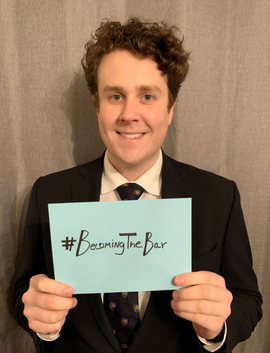
1. Tell us about your background and why you decided to become a barrister.
I grew up in a small village in Merseyside and was the first in my family to go to university. My father is a retired police officer and my mother a self-employed carer and childminder. I attended my local comprehensive school whilst caring for my grandmother. I also identify as gay, something for which I was relentlessly bullied. I knew I wanted to do something meaningful with my life but becoming a barrister did not even cross my mind; I did not think someone like me ever could.As a result, I decided to study languages at the University of Leeds. During my time at university, my confidence built and representation within all professions became a global discussion which is still ongoing today. It is finally being recognised that a more diverse and inclusive working world and media are needed to better reflect the society in which we live, and the Bar is no exception to this. This, coupled with a chance encounter at a local jobs fair, inspired me to pursue the Bar, recognising it as a place where I could explore my love of public speaking, undertake complex problem-solving and make a difference in the lives of others.
2. What kinds of challenges have you faced in your journey to getting pupillage and how have you overcome them?
Competition for pupillage is fierce. Rejection and hopelessness were concepts to which I became accustomed on a daily basis. The majority of applicants held good degrees, experience and accolades. It helped to create a support network both on the Bar course and within my Inn of likeminded individuals that I could speak to whenever times got tough. I look back at that difficult period as part of my training; the Bar has incredible highs but also crashing lows. Once you weather the storm, you will be thankful that you did when the true challenge of practice begins. Another significant obstacle I faced was funding the Bar Course, which can cause great difficulty for many aspiring barristers. I applied to Middle Temple for a scholarship. I had received an Access to the Bar Award earlier that year which really helped. I would advise anybody serious about a career at the Bar to apply, the Inns are very supportive of those from underprivileged backgrounds and the accolade looks fantastic on an application.
3. Tell us about your experience of training to become a barrister and how you prepared for pupillage applications.
I began a crime and family pupillage in September 2019 which I completed over 12 months. My ethos has always been that the best applications start long before words hit the page. I signed up to every pro bono opportunity I could; entered numerous competitions (losing many!); mooted; and networked. In hindsight, I think this helped me stand out. As a barrister I work long, unsociable hours. I have to frequently cancel social occasions when I receive last minute instructions and often work weekends. The pupillage committee who will be interviewing you will invariably have similar, if not busier, practices. Why not start developing and demonstrating that work ethic and dedication to your craft now?
4. What are the main challenges facing those currently applying for pupillage and those planning to apply for pupillage in the near future? How could they be addressed?
I could not answer this question without addressing the global public health crisis in which we all find ourselves. Many chambers are struggling just to survive at this incredibly difficult time. I think the main obstacle for those applying for pupillage or planning to do so is going to be how to stand out when there may be fewer pupillages available. There will be so many similar applications now speaking about using this time to attend webinars, enter online competitions and so on, all of which, I hasten to add, are invaluable and excellent things to be doing. That said, I would advise always taking it to that next level; asking yourself whether you can do more or how you can go further next time.
5. What advice would you give to prospective barristers from an under-represented background?
I grew up with very little positive representation of the gay community both in the media and in the professions. It is natural to feel that the Bar is a closed door. However, the society we serve comprises people from all different walks of life and the Bar is starting to emulate this. Take a look at outreach programmes such as Middle Temple’s ‘Access to the Bar Awards’, which changed my life. Check out the regional Bar and not just London. Finally, believe in yourself. One of the thrills of this profession is fighting for others so why not start practising by fighting for yourself?
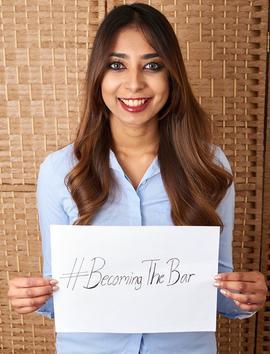
1. Tell us about your background and why you decided to become a barrister.
I was born and raised in Finland and moved to London at the age of 19 to pursue Law. My parents are from Bangladesh and Muslim and immigrated to Finland to have a better future for us and access to education. I decided to become a barrister while undertaking my LLB at the University of Westminster due to enjoying the advocacy element of being a barrister and the non-sedentary nature of the work.
I became particularly drawn to the family Bar when speaking to one of my tutors who had practiced as a family barrister and who shared what the work involved which sounded like a great opportunity to help people at a difficult stage of their life to move forward rather than look backwards. However, it was an uphill road in building a legal CV, as I was not only new to the field but also new to the country. I did not have any connections, I was not aware of what a mini-pupillage was, or that I had to join an Inn of Court or even where sets of chambers are located geographically and that often these areas are closed off to the general public during weekends leading to some very early mornings relying heavily on Google Maps.
2. What kinds of challenges have you faced in your journey to getting pupillage and how have you overcome them?
My first challenge was that as a non-Russell group, non-Oxbridge student often at networking events I would feel as though I was already on the back foot, although technically my peers and I were at the same stages of our studies or applications. I attended a former polytechnic, and it was made clear to me during the BPTC that while I had a first-class degree it was a ‘Westminster first’ and amounted to less. At careers advice, I was told that I had an interesting American accent, but this could be held against me as it is not typically what barristers sound like. I was also told that I looked quite young. I did not know that my accent or physique would impede my chances of pupillage before this.
I overcame these prejudices by ensuring that I could offer something valuable through what was perceived as unsuitable to the Bar. The fact that I was born and raised in Finland with Bengali parents has given me the ability to speak 5 languages. The fact that I look young does not mean that I am not strong-willed, as demonstrated by working full-time while undertaking the BPTC and a MA fulltime. I did not let my university hold me back; rather I demonstrated how I had excellent teaching and received a more hands-on approach tailored approach to learning.
3. Tell us about your experience of training to become a barrister and how you prepared for pupillage applications.
I chose my Inn of Court, Middle Temple due to a District Judge from an Asian background mentioning to me that Middle Temple was very inclusive and also had halal options – which was an important consideration for someone about to embark on 12 qualifying sessions which included many meals at the Inn.
I obtained pupillage on my second round after the BPTC, which meant that by the round I was successful I had good experience of going through the application. I prepared by going through chambers’ profiles to see if I could imagine working there. During the first rounds, I was so desperate to obtain pupillage that I would only think about “will the chambers like me?” but never spared a thought to whether I would like to work in that particular set. I feel by changing my attitude, I felt more confident and applied in a more focussed manner – putting my best foot forward.
4. What are the main challenges facing those currently applying for pupillage and those planning to apply for pupillage in the near future? How could they be addressed?
At the moment, one of the biggest worries is the decreasing numbers of pupillages being offered due to the effect of the pandemic. Some sets have decided from the previous rounds to start pupillage later which is going to have a knock-on effect on new hires. As an applicant there is more competition for fewer places, so really tailoring your application to the sets you are applying to and showing insight into the new ways of working e.g. remote hearings will be useful.
5. What advice would you give to prospective barristers from an under-represented background?
Do not let anyone tell you what the Bar looks like and what you should do to fit in, change the Bar to look like, sound like you do. There is talent in all of us that needs a platform to come through.
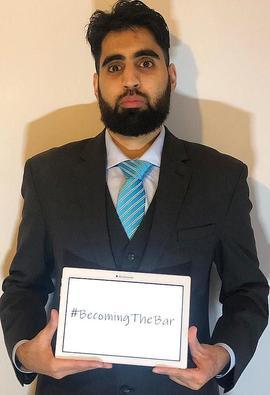
1. Tell us about your background and why you decided to become a barrister.
The Bar is a place where your voice can make a difference.
My experiences as the child of immigrants attending an underfunded and underachieving comprehensive school amplified the inequalities that are not always appreciated by those already at the Bar. I have vivid memories of a 13-year-old me assisting my neighbours with housing benefit forms and family members with immigration documents. Through these interactions, I was able to see a whole patchwork of need that goes unnoticed and unmet.
The need to give back to a community who had given me so much spurred me on to surpass the boundaries that confined someone from my background to existing stereotypes.
Although I knew I wanted to be an advocate of sorts, it was not until I was studying for my GCSEs that I found out what a barrister was. I was told this information by a careers service that was sadly made obsolete by the coalition government. I was intrigued by the idea of becoming a barrister but it took a great deal of internal persuasion to convince myself that I could make it a viable career. I am fortunate that my independent nature, tenacity, and desire to make myself heard are some of the qualities most valued at the Bar.
2. What kinds of challenges have you faced in your journey to getting pupillage and how have you overcome them?
Although I completed a law degree, I felt that I was not a "typical" Bar candidate, as my LLB was from a non-Russell Group university. This limited the amount of exposure I had to chambers which appeared to predominantly visit and encourage applicants from select universities and backgrounds. Fortunately, I had the means to attend various law fairs in London that chambers were often present at and so I could ask questions and learn more about the profession in that way. I am optimistic that the schemes being set up by many of my peers at the moment, who are committed to increasing diversity at the Bar, will mean that such challenges will hopefully be fewer for future applicants in my position and that the profession will feel much more accessible to those who may otherwise be overlooked.
Becoming a barrister was also a financial challenge. I worked each summer throughout my undergraduate degree and had two jobs whilst studying for my LLM, as I had no other source of funding to support myself with. These were not always legal positions. Whilst I was initially concerned about this when applying for pupillage, it became clear that this was an angle that could show further life experience and transferrable skills that some other applicants may not have been able to show. I found that many of the chambers I interviewed at were for example, genuinely interested to hear more about my position as a complaints handler for Europe's leading flatpack furniture company.
It took two years of interviewing before I was offered pupillage. My mindset at each interview was to give it my best shot but to learn from the experience in any event. This meant that instead of grinding me down, the long and arduous pupillage process was in of itself a way for me to develop and become a better candidate at the next interview. I also stayed involved with my Inn, Lincoln's, by taking on the role of witnesses during Pupils' Advocacy Training sessions. Apart from improving my acting skills, I was able to continue networking with other members of the Bar whilst also building on my reputation as a dependable member of my Inn.
I found that after unsuccessful interviews, there was very limited feedback from chambers. Whilst interviews were invaluable experience in and of themselves, the lack of feedback after putting so many resources into attending the interview felt like an unnecessary additional emotional challenge at the time. One set of chambers I interviewed at very kindly provided me with comprehensive feedback which I eagerly took on board; six weeks later I had an offer of pupillage from Spire Barristers. It really does make a difference.
3. Tell us about your experience of training to become a barrister and how you prepared for pupillage applications.
I studied for my BPTC at City University Law School and was fortunate to meet some inspirational tutors who supported me on my journey even though, on paper at least, I often felt like I did not belong at the Bar. My Inn was incredibly supportive, offering me a grant to pursue an internship at a non-profit organisation in Texas working with death penalty attorneys as well allocating me a place on its coveted 'Pupillage Foundation Scheme'. Knowing that I could hold my own amongst my peers and being aware of the belief others had in me reinforced my commitment to pursue a career at the Bar. Although my journey from Call to pupillage was relatively straightforward, I know all too well the anxiety shared by countless BPTC students who are in search of pupillage.
4. What are the main challenges facing those currently applying for pupillage and those planning to apply for pupillage in the near future? How could they be addressed?
One of the most obvious challenges that will present itself to current and future applicants is the competitiveness for pupillage. However, it is not enough to simply say that there is disproportionality between the number of positions available and the number of applicants seeking them. The introduction of the BCAT has done little, if anything, to ensure that the number of new BTC students is more aligned with the number of pupillages available. Of course, there is a real tension between course providers who appear happy to freely admit students and the harsh reality that there is already an ever-growing saturation of pupillage-seekers. This is something that anyone wishing to pursue pupillage will have to bear in mind.
Covid-19 has disrupted the way chambers are taking on new pupils. Anecdotally, I am aware of several pupillages due to start in 2020 being deferred until 2021; there have also been some stories of pupillages being pulled altogether or chambers pausing recruitment indefinitely. Although the full consequences of Covid-19 at the Bar are yet to emerge, pupillage seekers will have to be alert to the fact that many interviews, especially at the first-round stage, may be done remotely. This will pose new challenges, not least the fact that that interviewees will have to project their personality to a panel whilst being confined to a monitor.
5. What advice would you give to prospective barristers from an under-represented background?
I believe that being resourceful, working hard, and confidence in one's ability are vital skills to possess, particularly in a profession built on advocacy.
In addition to the obvious advice of looking up as many scholarships as possible and reading up on the law and chambers you would like to apply to, I would recommend that prospective barristers from underrepresented backgrounds pursue as many avenues of experience as possible.
As I highlighted above, transferrable skills are invaluable, particularly where you cannot find legal or directly relevant experience. Your sales position in the local grocery store highlights your ability to communicate with a broad range of people from different backgrounds; your time spent helping to coach your younger sibling's football team shows you can advocate for others and give strategic advice on the spot; your part-time secretary position shows you have the admin experience that will be required of any junior legal practitioner working through a 200-page bundle of documents.
Most importantly, take every opportunity that comes your way, and do not undervalue what you have to offer. The Bar must be as diverse as the community it represents, your addition can only be an asset.